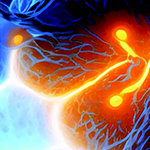News & Announcements
Read the latest news from Northwestern University Feinberg School of Medicine’s Department of Neuroscience. The links below take you to articles where you can learn more about our faculty’s latest achievements, awards and honors.
 01.05.2026
01.05.2026Northwestern Medicine scientists have discovered that targeting neuronal signaling controlling aberrant learning in the striatum may improve the efficacy of a first-line therapy for Parkinson’s disease and has the potential to reduce therapy-related side effects, according to a recent study published in Science Advances.
 12.09.2025
12.09.2025The human brain is often described as the most complex network in existence, with billions of neurons exchanging signals across intricate pathways. Recent research led by Feinberg investigators is revealing how different regions of the brain coordinate and process information, and how disruptions in these networks can impact health.
 11.03.2025
11.03.2025A new Northwestern study has uncovered how a key disease protein drives overactive nerve cells in neurodegenerative diseases like ALS and frontotemporal dementia.
 10.13.2025
10.13.2025Seventeen Northwestern University Feinberg School of Medicine faculty members recently appointed to endowed professorships were formally recognized at a group investiture ceremony on October 3.
Among the distinguished honorees was Mark Bevan, PhD, who was invested as the Rose, James, Sarah, and Max Meltzer Professor of Neuroscience.
 09.02.2025
09.02.2025When Sandra Edwards of Oak Ridge, Tennessee, was diagnosed with early-onset Parkinson’s disease in her late 30s, it marked the beginning of a decades-long journey that has inspired a powerful legacy: a gift to support neurodegenerative disease research at Northwestern University Feinberg School of Medicine.
 04.30.2025
04.30.2025A new Northwestern Medicine study has identified the molecular mechanisms that cause a commonly prescribed antipsychotic drug to produce harmful side effects similar to Parkinson’s disease symptoms, according to findings published in Molecular Psychiatry.
 04.03.2025
04.03.2025D. James Surmeier, PhD, was awarded a two-year grant from Spark NS for the development of a calcium channel inhibitor to slow Parkinson’s Disease progression. This is one of only eight projects and principal investigators selected for the SPARK NS Translational Research Program 2025 Cohort. Participation in a SPARK NS program cohort lasts two years and includes milestone-based funding of up to $2,000,0001 for each project, education and training in drug development and translational research for participating teams, mentoring from 75+ industry expert advisors, and scientific and business networking opportunities.